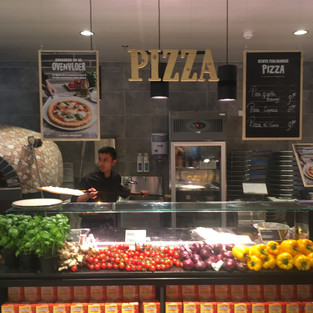We often call out the Netherlands as a benchmark market around retail development in Europe. Ahead of our Amsterdam and Utrecht safari on 14 May, here are some of the key ways through which it delivers on this.
Food-to-go lies at the heart of new format development
Retailing in the Netherlands, while in growth, is a competitive market, not least as the likes of Lidl continue to expand. Retailers as varied as Albert Heijn, Jumbo, Spar and Boon’s Market are increasingly putting food-to-go concepts front and centre in their latest developments. The latest Jumbo City, freshly opened in the heart of Utrecht, appears no exception to this trend.
The way stores maximise fresh expands the opportunity for other categories
While in many markets ready meals are segmented off in their own section of the store, in the Netherlands the focus differs , with the emphasis on fresh produce in these dishes meaning they fit perfectly in the core fresh section. In an environment in which fresh is increasingly key in-store, retailers in the Netherlands work off an expanded footprint, helping their fresh propositions to have greater impact than in many other Northern European markets.
Urban convenience format development is a priority
As in many other markets, consumer behaviours are changing in the Netherlands, creating more opportunities for smaller, locally oriented stores. A greater focus on targeting food-to-go missions has driven a greater focus on smaller format development aligned around this. Many of SPAR’s recent store developments, not least those in Utrecht, offer great examples of stores that are food-to-go first in their thinking.
Retailer counters focus on impact and efficiency
Like many markets, a rising cost of labour is something retailers have to manage in the Netherlands. And we know running counters can take a lot of labour cost, which for some retailers doesn’t deliver sufficient payback. But you’ll see counters as a strong feature in stores in the Netherlands. What’s the secret? A focus on counters that offer multiple grab and go solutions frees up staff to focus on preparing food rather than serving. At the same time, if you need something special, they are on hand to help.
There’s a focus on organics, plant-based and responsible retailing
On any Amsterdam retail safari, there is the chance to gain much inspiration around a different approach to doing business. Marqt and Landmarkt for example have long embodied these principles, with provenance, authenticity of sourcing and doing fair business across the supply chain principles that can also be seen in many Dutch exports - not least Tony’s Chocolonely, which also boasts its own store in Amsterdam, to help tell its story of how it is looking to change the way cocoa is sourced globally.
Food halls are expanding at pace and becoming stronger market benchmarks
Foodhallen has become a must see destination in Amsterdam - it remains a best in class European example of a foodhall. But across the Netherlands, foodhall development continues, using inspiring environments as the backdrop for a range of food-led experiences. And the same fusion of cuisines that makes food halls great is increasingly being reflected across the broader retail and food-to-go landscape, making it one of the best destinations for retail safaris in Europe.
Join us on May 14 in Amsterdam and Utrecht if:
You want insight on future format development - how a combination of fresh, food-to-go and food-for-later can create compelling store environments in to see some of the best in class retailing formats across Europe.
You want to understand if your product range or solution could prosper in the Netherlands market.
You need to know about how trends shape retail markets - we’ll update you on the broader evolution of European retailing and you’ll see in person the role the Netherlands market plays in shaping and leading much of that development.



















Comments